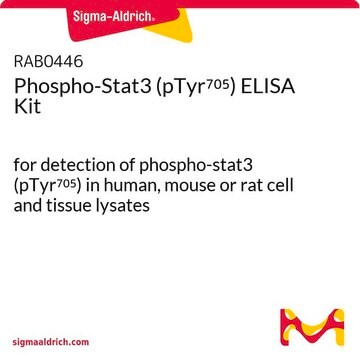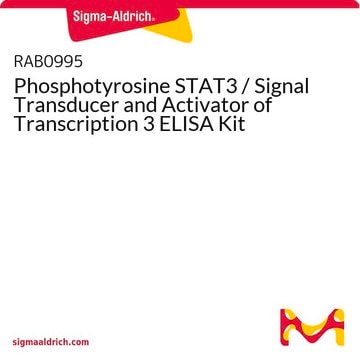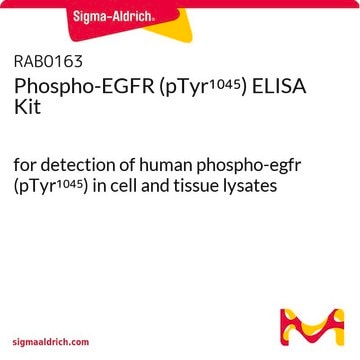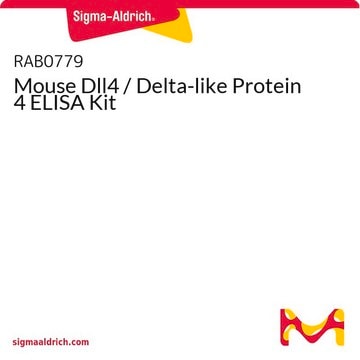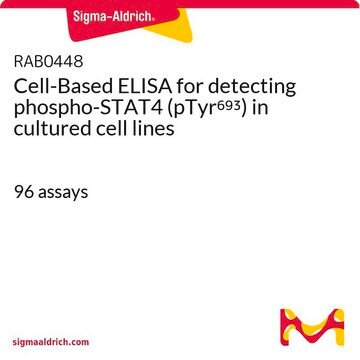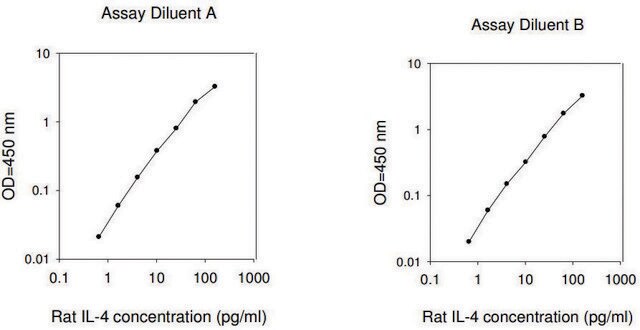RAB0447
Phospho-Stat3 (pTyr705) and pan-Stat3 ELISA Kit
for detection of phospho-stat3 (pTyr705) and pan-stat3 in human, mouse or rat cell and tissue lysates
Autenticatiper visualizzare i prezzi riservati alla tua organizzazione & contrattuali
About This Item
Codice UNSPSC:
41116158
NACRES:
NA.32
Prodotti consigliati
Reattività contro le specie
human, mouse, rat
tecniche
ELISA: suitable
capture ELISA: suitable
Condizioni di spedizione
wet ice
Temperatura di conservazione
−20°C
Informazioni sul gene
human ... STAT3(6774)
mouse ... STAT3(20848)
rat ... STAT3(25125)
Descrizione generale
Signal transducers and activators of transcription 3 (STAT3) is a transcription factor that belongs to the family of STAT proteins. The protein contains an Src homology 2 (SH2) domain for protein-protein interactions. STAT3 is activated by phosphorylation on tyrosine 705 by c-Jun N-terminal kinases (JNKs), cytokine receptor-associated kinases, nonreceptor tyrosine kinases, and growth factor receptor tyrosine kinases, in response to growth factors and cytokines. Phosphorylation of STAT3 is important for dimer formation and gene expression. STAT3 mediates the expression of a variety of genes that are involved in cell proliferation and differentiation. It also aids in pro-cancer immunity. The Phospho-Stat3 (pTyr705) and pan-Stat3 ELISA (enzyme-linked immunosorbent assay) is a very rapid, convenient, and sensitive assay kit that can monitor the activation or function of important biological pathways in cell lysates.
The Phospho-Stat3 (pTyr705) ELISA (Enzyme-Linked Immunosorbent Assay) kit is a very rapid, convenient and sensitive assay kit that can monitor the activation or function of important biological pathways in cell lysates.
Immunogeno
Stat3 (pTyr705) synthetic phosphopeptide, Recombinant Human Stat3
Applicazioni
Phospho-Stat3 (pTyr705) and pan-Stat3 ELISA Kit has been used in enzyme-linked immunosorbent assay (ELISA) for quantitative measurement of phosphorylated signal transducer and activator of transcription3 (p-STAT3) in liver tissues.
Avvertenze
Warning
Indicazioni di pericolo
Consigli di prudenza
Classi di pericolo
Met. Corr. 1
Codice della classe di stoccaggio
8B - Non-combustible corrosive hazardous materials
Classe di pericolosità dell'acqua (WGK)
WGK 3
Punto d’infiammabilità (°F)
Not applicable
Punto d’infiammabilità (°C)
Not applicable
Certificati d'analisi (COA)
Cerca il Certificati d'analisi (COA) digitando il numero di lotto/batch corrispondente. I numeri di lotto o di batch sono stampati sull'etichetta dei prodotti dopo la parola ‘Lotto’ o ‘Batch’.
Possiedi già questo prodotto?
I documenti relativi ai prodotti acquistati recentemente sono disponibili nell’Archivio dei documenti.
Jinbo Yang et al.
Cancer research, 65(3), 939-947 (2005-02-12)
Signal transducer and activator of transcription 3 (STAT3) is phosphorylated on tyrosine residue 705 in response to growth factors or cytokines to form activated homodimers that drive gene expression. Because the stat3 promoter has a binding site for STAT3 dimers
Marisa Dolled-Filhart et al.
Clinical cancer research : an official journal of the American Association for Cancer Research, 9(2), 594-600 (2003-02-11)
Although a high frequency of tumors contain constitutively activated signal transducers and activators of transcription 3 (Stat3), its relationship to breast cancer and patient survival has not been determined in a large retrospective study of node-negative tumors. To further elucidate
Targeting the Hepatocyte Growth Factor Receptor to Overcome Resistance to Targeted Therapies
Embryonic Stem Cell Protocols, 25-60 (2019)
Manar M Esmail et al.
Toxicology letters, 347, 23-35 (2021-05-08)
Liver fibrosis is the conjoint consequence of almost all chronic liver diseases. Cholestatic liver injury is a significant stimulus for fibrotic liver. This study was conducted to investigate the hepatoprotective effect of niclosamide as a NOTCH inhibitor and on the
Hyo Jeong Kang et al.
Oncotarget, 8(16), 27263-27276 (2017-05-04)
The non-receptor tyrosine phosphatase SHP2 has scaffolding functions in signal transduction cascades downstream of growth receptors. A recent study suggested that SHP2 acts as a tumor suppressor during hepatocellular carcinoma (HCC) development. Herein we examined whether SHP2 links the HBx-NF-κB
Il team dei nostri ricercatori vanta grande esperienza in tutte le aree della ricerca quali Life Science, scienza dei materiali, sintesi chimica, cromatografia, discipline analitiche, ecc..
Contatta l'Assistenza Tecnica.